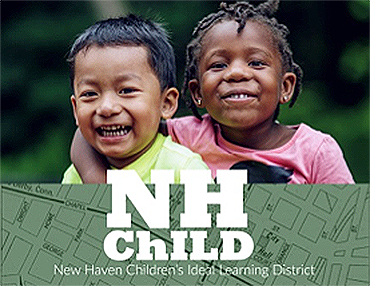The Bank Street Education Center has joined forces with two leading early childhood organizations to help increase access to high-quality care and education for children birth to age eight in New Haven, CT. Together with the Trust for Learning, a coalition of grantmakers dedicated to spreading ideal learning programs across local communities, and the Friends Center for Children, a New Haven-based early childhood education center, the Education Center co-launched the New Haven Children’s Ideal Learning District (NH ChILD) initiative to help revolutionize the city’s early care and education landscape.
 Launched in April, NH ChILD aims to galvanize the local community around a common vision of Ideal Learning, which the team defines as a commitment to developmentally meaningful, play-based, and trauma-informed care, to help provide quality experiences for all children.
Launched in April, NH ChILD aims to galvanize the local community around a common vision of Ideal Learning, which the team defines as a commitment to developmentally meaningful, play-based, and trauma-informed care, to help provide quality experiences for all children.
The new partnership is an outgrowth of a 2015 series of roundtable discussions among early education practitioners, researchers, and funders organized by the Trust for Learning. Participants included national leaders from key early childhood approaches, such as Friends Montessori, Reggio Emilia, Tools of the Mind, and Waldorf, as well as Bank Street College.
“For most of us, we were working together with colleagues across these multiple approaches for the first time in our careers,” recalls Virginia Casper, Director of International Initiatives & Partnerships at Bank Street, who participated in the roundtables. “It was a challenging but joyful experience to be able to come to a consensus on a set of principles for high-quality care and education for all children from birth to age eight. I’m looking forward to seeing how NH ChILD impacts the early care and education landscape in New Haven. ”
To help support the development of the city’s youngest citizens, the program will provide additional spaces for children in early childhood programs and roll out learning opportunities for providers and educators to help improve their capacity to provide developmentally-appropriate care.
“This project is important because too many of New Haven’s youngest children are impacted by multiple adverse childhood experiences from exposure to factors like poverty or violence, which can interfere with their ability to function well in school,” said Doug Knecht, Executive Director, Bank Street Education Center. “NH ChILD will increase the access to and the quality of early care and education for New Haven’s families in order to mitigate the effects of these adverse childhood experiences.”
To help make the case for NH ChILD, the Education Center co-wrote a white paper with Allyx Schiavone, GSE ‘94, Executive Director of Friends Center for Children. The paper outlined strategies to provide greater access to early care and education programs in the city, including increasing transportation to sites in underserved neighborhoods, developing a universal application system, and exploring different funding models. In addition, the paper discussed ways that New Haven could strengthen its existing programs to support the concept of Ideal Learning, such as creating professional learning communities for practitioners around specific inquiry questions, as well as creating degree-granting satellite programs for pre-k teachers.

Since New Haven’s demographics mirror those of larger metropolitan areas in racial makeup, age, education, and socioeconomic status, the results stemming from NH ChILD could serve as an adaptable model for the implementation of Ideal Learning communities across the nation.
Knecht and Schiavone presented a draft of the NH ChILD white paper at a roundtable discussion hosted by the Trust for Learning this April and were pleased by the outpouring of support from the New Haven community and other Ideal Learning partners.
According to Schiavone, her Bank Street education prepared her to take on a leadership role in the project. “My experience as a graduate student at Bank Street allows me to think about education from both a content and a systems perspective,” she said. “Co-authoring the NH ChILD white paper was a synthesis of my training at Bank Street, my leadership at the Friends Center for Children, and my experiences as a New Haven native.”
NH ChILD is the latest phase of Bank Street’s deepening partnership with the New Haven community. In the spring of 2016, New Haven Public Schools commissioned the Education Center to help assess early childhood practices, resources, and supports within the district’s Pre-K programs. The five-month process led to the creation of a set of recommendations designed to help inform the school district’s early childhood approach and support the improvement of classroom practice. Throughout the project, the Education Center worked collaboratively with educators and administrators from New Haven, the Graduate School of Education, and the Center for Emotionally Responsive Practice, as well as several Bank Street alumni, including Schiavone.
Based on the learnings, the Education Center worked in continued partnership with NHPS during the 2016-17 school year to implement a strategic set of professional learning sessions to support a common understanding of what developmentally appropriate curriculum and instruction look like for children ages three to six.
Thanks to a $100,000 grant from the Trust for Learning, the Education Center is excited to continue the planning phase for NH ChILD this summer as it works to identify implementation partners and engage the community. The work also includes raising funds for the implementation phase, scheduled to begin in the fall of 2018.
For more information on NH ChILD and to read the white paper, please visit newhavenchild.org.